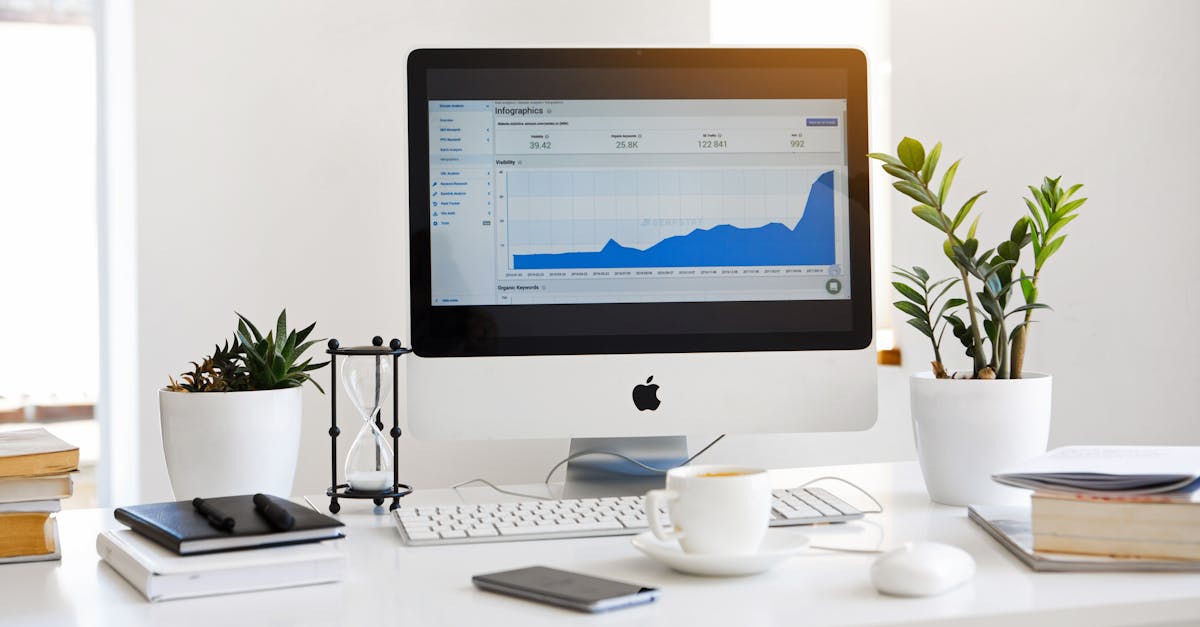- Google Ads
Facebook Ads vs Google Ads: Which Drives Better Leads in 2025?
Oct 17th, 2025
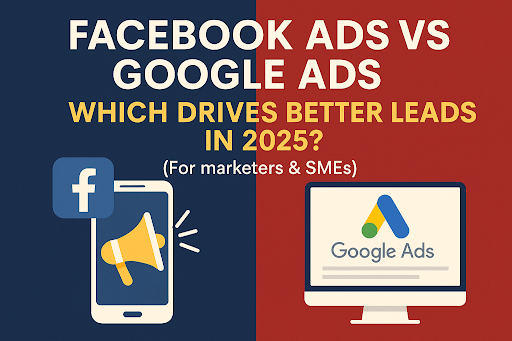
Share :

Written by Bobby Abrams
Table of Contents
- Introduction
- Lead Quality: Ready to buy vs. browsing
- Cost & Efficiency: What does it cost to get a lead?
- Automation & Optimisation: How smart are the platforms in 2025?
- UK Search Volume & Audience Intent Insights
- Which Platform Should UK SMEs Use — And How?
- Meta introduces AI-driven ad optimisation Sept 2025
- Conclusion & CTA
Introduction
In 2025, UK SMEs and marketers face a critical decision: should you allocate budget to Meta’s advertising platforms (Facebook/Instagram) or Google Ads? With Meta launching AI-driven ad-optimisation in September 2025 and Google maintaining its dominance in search, understanding which platform drives better leads — in terms of quality, cost and automation — is key to maximising your marketing budget in the UK context.
In this guide we’ll compare:
- Lead quality (who the leads are, how ready to convert)
- Cost & efficiency (what you pay, what you get)
- Automation & optimisation tools (how both platforms use AI/ML)
- UK-specific search volume / audience intent insights (e.g., via keyword research, SEMrush)
- Practical advice: which to use, when, and how for UK SMEs.
1. Lead Quality: Ready to buy vs. browsing
Google Ads – high-intent searchers
In the UK, Google Ads tend to capture people who are actively searching for solutions (“solicitor London”, “plumbing repair Manchester”, “digital marketing agency UK”), so the leads you get are usually further down the funnel and closer to conversion. This tends to increase lead quality for service-based SMEs.
Meta/Facebook Ads – interest, awareness & broader reach
On Facebook (and Instagram via Meta) the user is generally in a browsing mindset — not actively searching for your service, but could be persuaded. That means you can generate more leads (in volume) but potentially lower intent. In a UK e-commerce comparison, one article noted that Meta is strong for discovery or impulse-driven purchases.
UK-specific nuance
For UK SMEs offering higher-value, consultative services (legal advice, B2B professional services, large-ticket items), the difference in lead readiness matters significantly. If you generate lots of leads via Meta but the cost to close is high (because you have to nurture heavily), your ROI may suffer.
Takeaway on quality
- Use Google Ads when your target audience already knows their need, is actively searching, and you want leads who are ready to buy.
- Use Meta/Facebook Ads when you’re building awareness, targeting an audience that doesn’t yet know your brand or solution, or you’re nurturing a longer sales cycle.
- In the UK market, balancing both is often smart: Google for intent-capture, Meta for reach & interest generation.
2. Cost & Efficiency: What does it cost to get a lead?
UK cost benchmarks
A UK-focused benchmark report showed:
- On average UK CPC for Google Ads (search) higher than for Facebook/Meta.
- Example: Google Ads CPC around £4.21 vs Facebook Ads around £1.38 in one dataset.
- Cost per acquisition (CPA) or cost per lead (CPL) similarly variable: one UK source cited Facebook average CPA ~ £14.94 vs ~ £39.17 on Google, though results vary widely by industry.
But caveats
- Lower cost per lead on Facebook doesn’t automatically mean better value if the leads close at a much lower rate or have lower lifetime value.
- For Google, although cost per click/lead is higher, the quality is often better (higher conversion rate) which can justify the spend for UK SMEs.
- UK tracking issues: In UK context, attribution, GDPR, ad-blockers, and browser changes can impact observed lead volume and quality. For example, one Reddit thread noted serious discrepancy between Google Ads clicks and UK Shopify sessions.
Efficiency strategy for UK SMEs
- Define your target cost per acquisition (CPA) not just cost per lead. E.g., if only 1 in 10 leads closes, a £15 lead from Facebook may cost £150 per closed sale, versus maybe £40 lead via Google might cost £400 per closed sale depending on closing rate.
- Use Google Ads for your “ready to buy” keywords in the UK (e.g., “digital marketing agency London”, “commercial contracts lawyer UK”) to capture high-intent.
- Use Facebook Ads for earlier funnel activities: awareness, retargeting website visitors, building look-alike audiences. This tends to lower cost but requires careful nurturing.
3. Automation & Optimisation: How smart are the platforms in 2025?
Meta / Facebook Ads – UK focus with AI enhancements
In September 2025, Meta introduced new AI-driven optimisation tools: improved ad-ranking, landing-page-view optimisation, value-rule automations for upper funnel campaigns. This is relevant for UK marketers who may not have large optimisation teams. (While I don’t have a UK-specific breakdown of rollout, these features apply globally.)
This means fewer manual tweaks may be needed; for UK SMEs the ability to “set and forget” a campaign with optimisation built-in becomes more attractive.
Google Ads – automation & machine-learning
Google Ads continues to evolve: automated bidding strategies, responsive search ads, smart campaigns, AI-based audience signals. For UK users, especially in competitive keywords, this helps but also means you need strong assets (keywords, landing pages, ad copy) to saturate the potential.
UK implication
- For smaller UK SMEs with limited internal PPC resource: Meta’s newer AI tools may provide easier access to performance.
- For experienced UK advertisers with mature Google search campaigns: the automation helps but won’t replace the need for strong fundamentals (keyword strategy, bidding, measurement).
- Both platforms benefit from good data: use first-party data, conversion tracking, and UK-appropriate formats (e.g., UK language, UK location targeting, UK timezones, GBP currency).
4. UK Search Volume & Audience Intent Insights
Search-volume & intent context in the UK
- UK users searching for services generally start their journey with Google — intent is high. A UK resource notes Google Shopping vs Facebook Ads in UK e-commerce: Google captures high-intent shoppers while Facebook nurtures the customer base.
- Another UK article emphasises that for businesses in the UK, the decision between Google vs Facebook Ads depends on what stage the customer is in.
Using tools like SEMrush
- For UK campaigns, use SEMrush (or similar) to check keyword monthly search volume, competition (CPC estimate), and intent (e.g., transactional vs informational).
- For Meta/Facebook, since users are not actively searching, you rely less on keyword volume and more on audience-profiling: demographics, interests, behaviours relevant in UK (e.g., “working professionals London”, “SME owners UK”, “interest: commercial law UK”).
- Use combined insight: If there is a strong search volume in the UK for your service (e.g., “SEO agency London” has 1,000+ searches/month), that signals Google Ads may be fruitful. If search volume is low but you observe a niche audience you’d like to reach via interest/behaviour, then Meta can help.
UK nuance of intent vs volume
- A high-volume keyword in the UK doesn’t guarantee good leads — you still need tight targeting, location filters, ad copy adapted to UK audience.
- For Meta audience targeting in the UK, ensure you use UK-specific cultural/linguistic cues and timing (GMT/BST) and localised offers (e.g., “free London consultation”, “UK-based agency”).
- Tracking & attribution in the UK: ensure conversion tracking is set up (UK GDPR, cookie consent, first‐party data) so you accurately compare platforms.
5. Which Platform Should UK SMEs Use — And How?
When to prioritise Google Ads (UK edition):
- You have a defined service or product that UK customers actively search for (e.g., “M&A advisory US expansion UK”, “UK commercial contracts lawyer USA”, “SEO agency UK for e-commerce”).
- You have an established conversion funnel (click → enquiry → meeting → sale) and know your metrics.
- You’re willing to pay higher cost per click/lead but expect higher closing rate and lead value.
When to prioritise Meta/Facebook Ads (UK edition):
- You need to build awareness, reach new audiences, introduce a service that UK-prospects may not yet directly search for.
- You have a longer sales cycle, expect to nurture leads over weeks/months (common in B2B or professional services in the UK).
- You want lower cost per lead to feed into your funnel (even if conversion rate is lower) and you have the infrastructure to nurture.
When to use both combined (UK strategy):
- Use Google Ads to capture UK-based searchers with high buying intent.
- Use Meta Ads to build a funnel: target UK audiences who haven’t searched yet, retarget those who visited your site via Google, create interest-based lookalikes.
- Example budget split (UK SME starting point): maybe 60% of budget to Google for conversion, 40% to Meta for awareness/retargeting — adjust based on results.
- Measure: cost per lead (CPL), cost per acquisition (CPA), and lifetime value of customer (LTV) for each platform in UK context.
- Use localised language, offers and creative: e.g., UK spelling (“organisation” vs “organization”), currency (GBP), locale-based targeting (England/Scotland/Wales/Northern Ireland), time zones (BST/GMT).
- Ensure you have UK-specific tracking and consent processes (GDPR compliance, cookie banners) to avoid under-reporting or data loss.
6. “Meta introduces AI-driven ad optimisation Sept 2025” — Implications for UK Marketers
- With Meta’s new AI-driven optimisation tools (rolled out globally, applicable to UK), UK advertisers gain more automated targeting/creative optimisation and landing-page-view optimisation even without heavy manual setups.
- For UK SMEs this translates into: less need for large PPC teams, faster ramp-up of campaigns, possibly lower barrier to entry for Meta ads.
- But: automation doesn’t fix targeting or creative mis-match. UK marketers still need strong UK-relevant messaging (“UK-based agency”, “Serving SMEs in London & Manchester”, “GBP pricing”, etc) and solid landing pages.
- Tracking/discrepancies: In the UK, privacy/consent changes mean conversion tracking may be harder — relying on Meta’s automation doesn’t replace your need for proper data collection and measurement.
Conclusion & CTA
In the UK market, neither platform is an automatic winner — the best approach depends on your offer, funnel, budget and target audience.
- If your goal is capturing ready-to-buy leads in the UK, invest in Google Ads.
- If your goal is building awareness, reaching a broader UK audience, or nurturing interest over time, use Meta/Facebook Ads.
- For most UK SMEs, a hybrid approach works best: Google for conversion, Meta for awareness + retargeting — and monitor cost per valuable lead (not just cost per lead).
- Use tools like SEMrush to validate UK keyword volume and intent, segment your UK audience carefully, track cost vs quality, and take advantage of both platforms’ automation (especially Meta’s new tools) while paying attention to UK-specific tracking and compliance issues.
About the Author

Bobby Abrams
Bobby Abrams specialises in helping businesses achieve better results. With a decade of sales and consulting experience, he has worked with hundreds of companies across different sectors. Bobby is passionate about using the latest technology to shape strategy and works closely with expert teams to deliver impactful projects on behalf of his clients.
Disclaimer
The information on this website is for general guidance only. EclickPro provides digital marketing services including SEO, Google Shopping, and Meta Ads, but results vary by client and are not guaranteed. We do our best to ensure accuracy, but we do not accept liability for actions taken based on this content. For personalised advice, please contact us directly.
Related Blogs
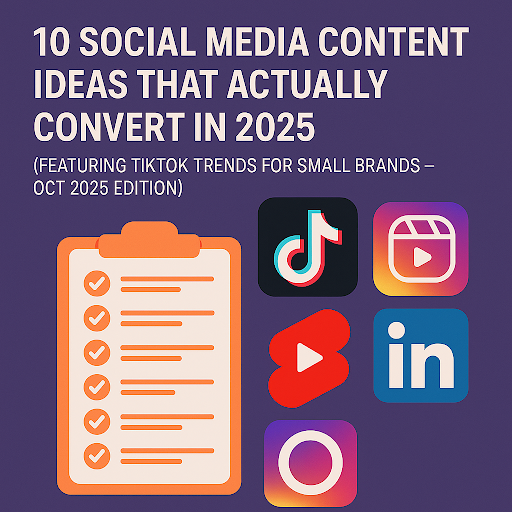
10 Social Media Content Ideas That Actually Convert in 2025
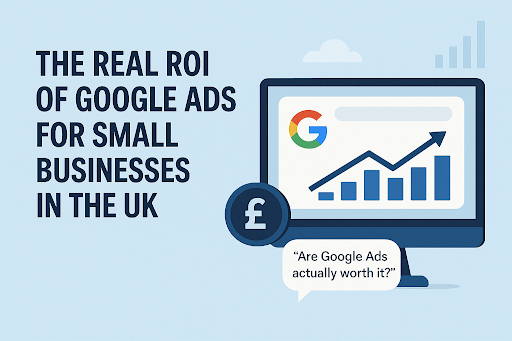
The Real ROI of Google Ads for Small Businesses in the UK
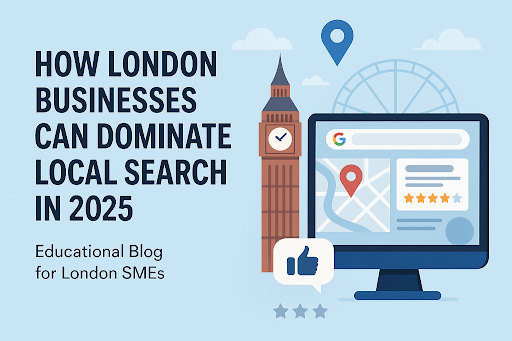
How London Businesses Can Dominate Local Search in 2025
